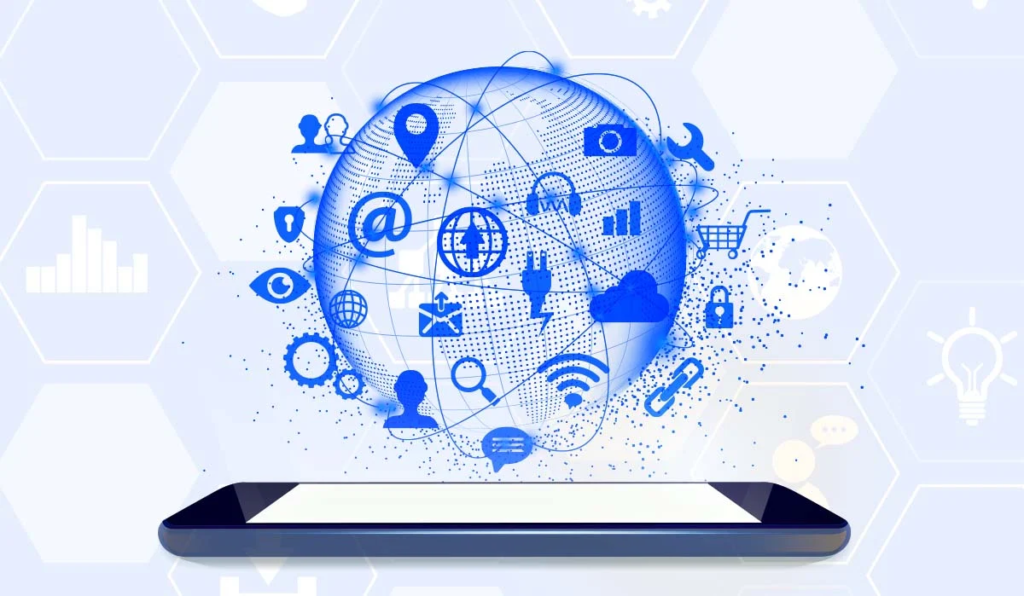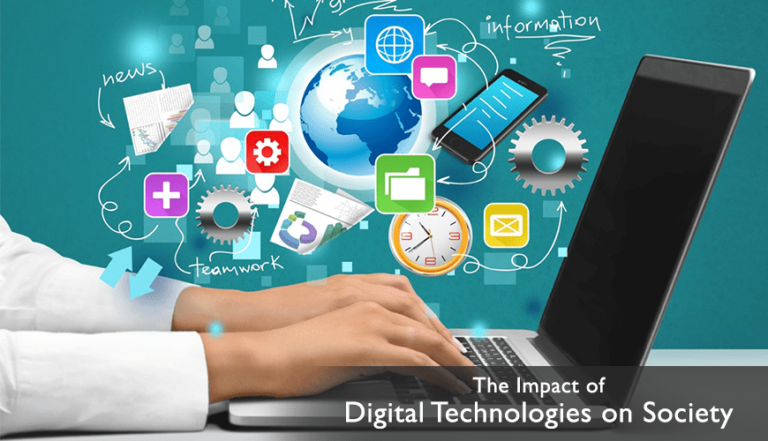Digital technology is changing the way we live, learn, and interact. From the phones in our pockets to the gadgets we use daily, technology has made our lives easier and more connected. In this article, we will explore what digital technology is, how it impacts our daily lives, its benefits, challenges, and its future. We’ll also discuss how to stay safe online, including the importance of cybersecurity.
What is Digital Technology?
Digital technology refers to electronic tools, systems, devices, and resources that generate, store, or process data in digital form. This includes computers, smartphones, software applications, social media platforms, and even smart appliances like refrigerators or thermostats. Unlike traditional technology, digital technology uses binary code (0s and 1s) to perform operations, enabling faster and more efficient processing of information.
Through the use of digital tools, people can communicate instantly, access vast amounts of information, and perform various tasks that were once time-consuming or impossible. Digital technology has revolutionized everything from how businesses operate to how individuals manage their personal lives.
How Digital Technology Impacts Our Daily Life
Digital technology has dramatically transformed our everyday routines. Most people carry smartphones, which are powerful digital devices that allow us to communicate, access the internet, shop, and work from virtually anywhere. These gadgets are not just for entertainment or personal use; they also serve as essential tools in business, education, and healthcare.
For instance, in the field of education, students now have access to digital classrooms, e-books, and online courses, allowing for flexible and personalized learning experiences. In healthcare, digital technology enables doctors to diagnose and treat patients more efficiently through telemedicine and advanced medical imaging systems.
Moreover, digital technology helps people stay connected through social media, instant messaging, and video calls. With the advent of digital tools, distance and time are no longer barriers to communication and interaction.
Benefits of Digital Technology
Digital technology has many benefits that make life easier, faster, and more efficient. Let’s take a closer look at some of these advantages:

- Increased Productivity: Digital tools, such as word processors, spreadsheets, and project management software, help people get tasks done faster and more accurately. In the workplace, digital technology enables employees to collaborate seamlessly with colleagues worldwide.
- Convenience: Digital technology allows for activities such as online shopping, food delivery, and banking to be done quickly and conveniently from the comfort of your home. With mobile apps, you can access services and manage tasks without stepping outside.
- Access to Information: With digital technology, people can access vast amounts of information on almost any topic imaginable. This has made it easier for individuals to learn new skills, stay informed about current events, and find solutions to everyday problems.
- Improved Communication: From email to social media platforms, digital technology has revolutionized how we communicate. It’s easier than ever to stay connected with friends and family, share updates, and collaborate with coworkers across the globe.
Learning with Digital Tools
Digital technology has revolutionized education. Learning tools, such as e-books, educational apps, and online courses, allow students to learn at their own pace. Whether it’s watching instructional videos on YouTube, attending virtual classes, or reading online tutorials, technology has made education more accessible than ever before.
Digital tools are also making education more interactive, with virtual classrooms where students and teachers can interact in real-time. These platforms enable learners to access educational resources from around the world, breaking down geographical barriers.
The Role of Social Media in Digital Technology
Social media platforms like Facebook, Twitter, Instagram, and TikTok are integral parts of digital technology. They allow individuals to connect, share content, and express opinions, fostering a global network of communication.
For businesses, social media offers an invaluable tool for marketing, branding, and customer engagement. By using digital tools, companies can reach a wider audience, collect feedback, and promote products more efficiently than ever before.
However, while social media has many benefits, it also presents challenges, such as misinformation, privacy concerns, and cyberbullying, which we will explore later in this article.
Digital Entertainment
One of the most common ways people use digital technology is for entertainment. Streaming services like Netflix, Hulu, and Spotify have transformed how we consume movies, music, and TV shows. These services allow users to access a massive library of content anytime and anywhere, without needing to download or purchase physical copies.
Additionally, digital technology has given rise to gaming platforms such as PlayStation, Xbox, and PC gaming, where millions of people interact with others from around the world in real-time.
The digital entertainment industry continues to evolve, with virtual reality (VR) and augmented reality (AR) offering new and immersive experiences.
Challenges of Digital Technology
Despite all its benefits, digital technology also presents several challenges. One of the major concerns is the digital divide—while many people in developed countries have access to the latest technology, individuals in developing nations still struggle to access even basic digital tools.
Another challenge is cybersecurity. As more personal and financial information is shared online, there are increasing risks of identity theft, fraud, and cyberattacks. Moreover, the rapid pace of technological advancement means that keeping up with security measures can be difficult for both individuals and businesses.
The Future of Digital Technology
Looking ahead, digital technology is set to become even more advanced. We are seeing a growing trend in automation, where machines and software are capable of performing tasks without human intervention. Artificial intelligence (AI) is becoming more integrated into our daily lives, from virtual assistants like Siri to self-driving cars.
The future of digital technology also includes innovations like the Internet of Things (IoT), which allows everyday devices to communicate with each other through the internet, creating a more connected world. We may also see further developments in virtual and augmented reality, enabling people to interact with digital environments in new ways.
How to Stay Safe Online
As we use digital technology more frequently, it’s important to stay safe online. Here are some tips for protecting yourself:

- Use Strong Passwords: Always create strong passwords and change them regularly. Avoid using easy-to-guess passwords like your birthdate or “password123.”
- Be Cautious About Sharing Personal Information: Be mindful of what you share on social media and online platforms. Avoid posting sensitive details that could be used to steal your identity.
- Update Software Regularly: Make sure your devices and applications are up-to-date. Security patches are often included in updates, protecting you from potential threats.
What is Cybersecurity?
Cybersecurity refers to the practice of protecting systems, networks, and data from digital attacks, unauthorized access, or theft. In today’s world, where most activities happen online, cybersecurity is crucial to safeguarding personal and professional information.
Cybersecurity involves using firewalls, encryption, antivirus software, and other methods to protect your devices and data from malicious actors. By implementing strong security measures, you can reduce the risk of falling victim to cybercrime.
Is Digital Technology for Everyone?
While digital technology has become a staple in modern society, it’s important to remember that it may not be accessible to everyone. In many areas, especially in rural or underserved regions, there may still be barriers to access, such as the lack of high-speed internet or the inability to afford digital devices.
However, efforts are being made to bridge this digital divide, from community programs that offer free technology access to governments working to improve internet infrastructure.
Embrace Digital Technology
Digital technology has undoubtedly changed the world in countless ways. It has made our lives more convenient, connected, and efficient. As we move forward, it is essential to embrace these changes while also remaining aware of the challenges and risks.
By staying informed about the latest digital trends, using technology responsibly, and taking the necessary precautions to protect our personal information, we can make the most out of the exciting world of digital technology.
The Future of Digital Technology
In the future, digital technology will continue to evolve and impact various aspects of our lives. The integration of AI, 5G connectivity, and quantum computing will bring about innovations that will further improve efficiency, connectivity, and the way we interact with the world around us.
From healthcare to education, business, and entertainment, digital technology will continue to shape and redefine our world. The possibilities are endless, and the future looks bright as we unlock the potential of this exciting digital age.
The Bottom Line
Digital technology is transforming every aspect of our lives. While it comes with challenges, such as cybersecurity risks and the digital divide, it also offers immense benefits, from increased convenience to more personalized learning and entertainment options. By staying informed, adopting digital tools responsibly, and ensuring our online safety, we can make the most of the digital age and embrace its exciting future.


